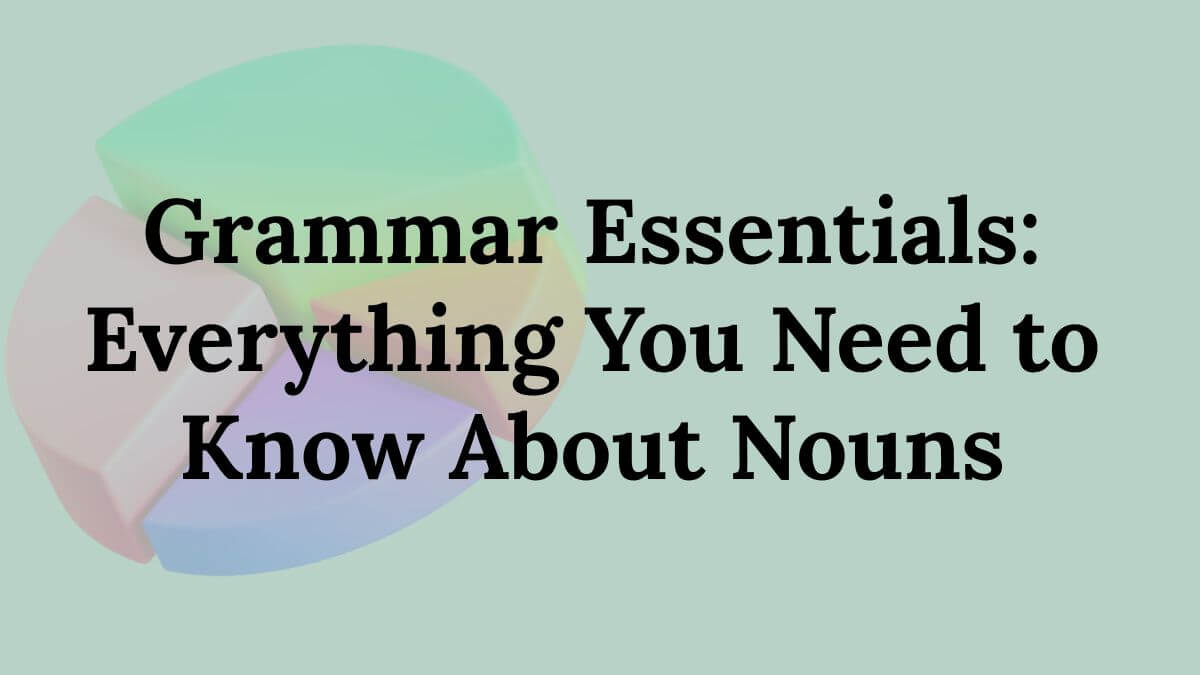Understanding the building blocks of language is the first step toward mastering English grammar. In this guide, we’ll explore one of the most essential parts of speech: nouns. Whether you’re a learner looking to improve your grammar skills or an educator searching for clear explanations, this post has you covered. Let’s dive into these Grammar Essentials and uncover everything you need to know about nouns.
What Are Nouns?
A noun is the name tag we give to everything around us—people, places, objects, and even thoughts It’s one of the first parts of speech taught in English because it’s so frequently used in daily communication. Grammar Essentials
Common Examples of Nouns:
- People: teacher, friend, doctor
- Places: school, city, park
- Things: book, phone, chair
- Ideas: love, freedom, courage
Nouns are the core words that bring sentences to life. In this blog, we’ll break down different types of nouns, how they function, and how to use them correctly—part of your essential Grammar Essentials toolkit. Grammar Essentials
Types of Nouns
English nouns can be classified into several types, each with its own function.
- Common Nouns
These represent everyday, non-specific items we encounter in daily life—like a dog, a car, or a flower—without pointing to any particular one.
- Proper Nouns
Proper nouns are the unique labels we give to individual people, landmarks, and institutions, setting them apart from the general crowd. They always begin with a capital letter. Examples: John, London, Microsoft. Grammar Essentials
- Abstract Nouns
Abstract nouns refer to ideas or concepts that cannot be seen or touched. Examples: honesty, bravery, and happiness.
- Concrete Nouns
Concrete nouns represent physical objects. You can touch, see, or feel them. Examples: table, apple, phone. Grammar Essentials
- Countable and Uncountable Nouns
- Countable: Can be counted (apple/apples)
- Uncountable: Cannot be counted (water, sugar, information)
Functions of Nouns in Sentences
Nouns can play different roles in a sentence:
Subject
The person or thing doing the action. Example: The cat is sleeping.
Object
The person or thing receiving the action. Example: She hugged her brother.
Complement
Provides more information about the subject or object. Example: He is a teacher.
The object of a Preposition
Follows a preposition. Example: The book is on the table.
Rules for Using Nouns
- Capitalization
Proper nouns should always be capitalized. Example: Sarah went to Paris.
- Plural Forms
- For most nouns, add -s: car → cars
- If a noun ends in -y after a consonant, change -y to -ies: baby → babies.
- Irregular forms: child → children, mouse → mice
- Possessive Nouns
Use an apostrophe to show ownership:
- Singular: John’s book
- Plural: The dogs’ toys
- Gender in Nouns
Some nouns indicate gender: waiter/waitress, actor/actress. However, modern English is moving toward gender-neutral terms. Modern English now prefers gender-neutral words for inclusivity.
Examples of Nouns in Sentences
Here are a few sentences that highlight different noun types and roles:
- Maria (proper noun) traveled to Italy (proper noun).
- The dog (common noun) barked loudly.
- She felt great joy (abstract noun) after winning.
- I bought a pen (concrete noun) from the shop.
- Please give me the information (uncountable noun).
Understanding these examples is a key part of your Grammar Essentials journey.
Read More:
A Simple Guide to the Parts of Speech with Examples
I Disagree With You – 25 Strong Alternative Ways to Say
Tips to Master Nouns
- Read regularly to see how nouns are used in context.
- Practice by identifying nouns in sentences.
- Create noun lists by category (e.g., places, things, ideas).
- Use flashcards to reinforce your learning.
These tips will strengthen your grasp of English and help you apply nouns confidently.
Why Nouns Matter in Grammar Essentials
Nouns form the base of communication. Without them, we wouldn’t be able to name or describe anything. That’s why they are central to any discussion of Grammar Essentials. Understanding nouns not only improves your writing but also your speaking and reading comprehension.
Conclusion
Nouns are a fundamental part of English grammar and a key element in every sentence. By understanding what nouns are, how they function, and the various forms they take, you can dramatically improve your command of the English language. These Grammar Essentials are the tools you need to grow as a learner or teacher of English.Keep practicing and revisiting these concepts, and soon nouns will become second nature to you. Whether you’re writing essays, teaching lessons, or having a conversation, nouns are your best friend in the world of grammar.
